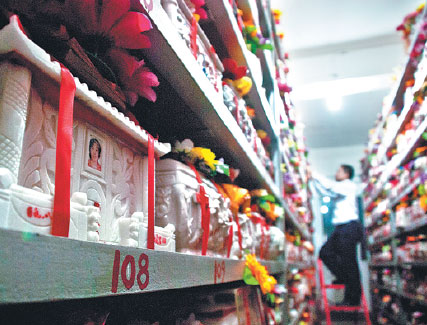Funeral services check out China's digital dimension
By Ren Xiaojin (China Daily) Updated: 2017-04-03 07:19"Selling a funeral service is like selling clothes. Do you argue with your customers to change their style? Or do you sell them what suits them best?" That's Qi Weijing, founder of Jiuhua Zhengyuan Co Ltd, a company combining funeral services with the internet.
"Why would I want to change people's mindset? I just give them what they desire."
Qi, a man in his mid-30s with an impressive resume - including master's degrees from Peking University and the Renmin University of China, IT startup experience and most importantly, a charming baritone voice - is now venturing boldly into a millennia-old industry: funeral services.
Among Qi's ideas, a cemetery equipped with charging points for new energy automobiles, a cafe lounge for those needing a hot drink to warm their hearts and a VIP reception room, all at a cost equal to traditional cemeteries in the same city.
Ready to buy 10 cemeteries in Beijing by the end of this year and decorate them in a friendly and gentle way, he and his team are ready to offer what people have never thought could be provided before.
"Every cemetery has thousands of graves made of nonreusable materials. The technology to replace them is there, but not every cemetery owner wants to do it," Qi said. "Take a look at the traditional cemetery in Ba Bao Shan, during Tomb Sweeping Day. The traffic is horrible, but all they need is a special system to control it."
Like for many other online funeral startup owners, the internet is an important part of Qi's strategy. On his online platform, people can pay their condolences or order flowers for their lost ones.
"I think the key is to design a very friendly user interface, so people don't feel overwhelmed by death."
But living in a digital age, when every business seems to be embracing the mighty internet to survive, paying condolences online or even shopping online for funeral arrangements and products, or even graveyards, is not exactly new.
What is really concerning many startup owners is which areas are profitable - and some of them have learnt their lessons the hard way.
"The majority of customers are over 50 years old and are not so open to the internet," said Xu Yi, co-founder of Bi An, a funeral e-commerce company, in an interview with Xinhuanet.com.
"They don't think buying a casket can be easily done by a click online."
The previously much-anticipated e-commerce company, which was tipped to challenge the dominance of traditional players, came to a sticky end.
"We tried to lower our prices, but costs kept rising," said Xu. "After losing 1 million yuan ($145,000) investment, we had to close down."
While many online funeral service providers like Yiko.org are betting on younger people who are more open to the concept of online funerals, and bringing down prices by using online platforms, Qi said he had another angle.
"People want to buy overpriced products to pay their respects. How can we change their mindset? We can't. But we can help them spend the same amount of money in a wise way," he said.
Qi said he looked into prices informally and found 800 yuan caskets marked up to just under 20,000 yuan at a funeral parlor located just outside a Beijing hospital.
Qi added that public cemeteries are the result of urbanization. Families could not have traditional family vaults or crypts any more, so they tended to spend more on individual services to compensate.
On Qi's online platform, people are allowed to send tributes, flowers, and such items.
"So you don't need to break the bank going all out buying an expensive casket. We don't want to lecture people about grieving. But we do want them to feel the time of transition is more of an everyday event," he said.
"I have spent five years in planning (my service) and listening to what they want. If they provided with a convenient choice and a better service at the same price, they will come to me."
Despite all the planning, however, Qi has encountered problems. Like others in the same line of work, he has faced problems in securing financing because of the taboo-laden nature of the job.
"Investors may realize it is a profitable industry, but they are too afraid," he said.
"I had a potential investor come on a field trip to a graveyard with me. The next day he told me he has got a fever which made him horrified."
Another problem has been getting the right staff.
"Funeral services aren't included in college or university courses," he said.
He said potentially suitable employees could come from the nursing or even hospitality sectors, but they needed to be introduced to the new industry.
To avoid scaring people off, Qi and his company have set up a training course with universities, including Shanghai Jiao Tong University, with the description of "post-life" services.
renxiaojin@chinadaily.com.cn
|
A worker at a funeral parlor in Xiamen, Fujian province, arranges cinerary caskets. Wang Zhilong / For China Daily |
- 'Cooperation is complementary'
- Worldwide manhunt nets 50th fugitive
- China-Japan meet seeks cooperation
- Agency ensuring natural gas supply
- Global manhunt sees China catch its 50th fugitive
- Call for 'Red Boat Spirit' a noble goal, official says
- China 'open to world' of foreign talent
- Free trade studies agreed on as Li meets with Canadian PM Trudeau
- Emojis on austerity rules from top anti-graft authority go viral
- Xi: All aboard internet express












